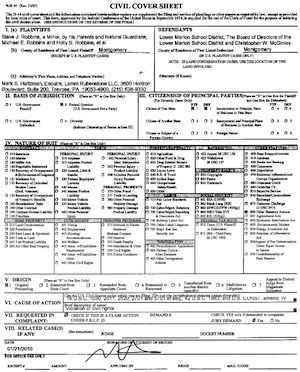FBI Probes District Accused of Spying on Students Using Webcams
Lawsuit filed in Pennsylvania says district-supplied laptops were used to take pictures of minors in their homes. Lower Merion School District has denied wrongdoing.
[Latest update: Feb. 19, 2010 at 6:13 p.m., adding information uncovered by the Associated Press Friday evening. --David Nagel]

Click image for online version of complaint, case No. 2:2010cv00665 |
Following allegations that the district used Webcams to spy on students in their homes, Lower Merion School District in Pennsylvania Thursday deactivated a security feature on the laptops it issued to students as part of a 1:1 mobile computing initiative, in which every high school student received a Mac notebook.
The district's decision followed widespread reports of the lawsuit Thursday, which alleged that the security feature had been misused to spy on students in their homes using an integrated Webcam on their laptops, with some reports suggesting it might have been used for lewd purposes.
According to a report by the Associated Press Friday night, the FBI is now investigating the case to determine whether the district violated federal wiretapping or intrusion laws. In its report, the AP cited an anonymous source in the FBI.
The lawsuit, filed Feb. 16, had been widely circulated throughout the day Thursday, causing the district to post a response and, later, a letter to parents, saying that it denied any use of the technology other than as a security feature to locate lost or reportedly stolen equipment.
While denying misuse, the district has deactivated this feature and promised that it would not reactivate it without "express written notification to all students and families."
The lawsuit (Robbins et al v. Lower Merion School District et al, case No. 2:2010cv00665) alleges a wide range of violations of state an federal laws--from illegal interception of electronic transmissions to violations of civil rights--based on an alleged incident Nov. 11, 2009 in which a student was, according to the document, disciplined by a high school assistant principal because he "was engaged in improper behavior in his home, and cited as evidence a photograph from the webcam embedded in minor Plaintiff's personal laptop issued by the School District."
The nature of the photograph was not revealed in the complaint, which was filed in the United States District Court for the Eastern District of Pennsylvania. However, the suit states that the plaintiffs are prepared to amend their complaint should discovery uncover compromising images of minors.
In a statement posted on the school district's site Thursday, Superintendent Christopher McGinley, named as a defendant in the lawsuit, said:
Last year, our district became one of the first school systems in the United States to provide laptop computers to all high school students. This initiative has been well received and has provided educational benefits to our students.
The District is dedicated to protecting and promoting student privacy. The laptops do contain a security feature intended to track lost, stolen and missing laptops. This feature has been deactivated effective today.
The statement explained that the "Apple computers" that the district provides to students are equipped with Webcams by default and that the security feature in question "was installed to help locate a laptop in the event it was reported lost, missing or stolen so that the laptop could be returned to the student."
Further, while he confirmed that the computers distributed to students do incorporate the technology that would allow district personnel to take still images from Webcams, this technology was only used in limited circumstances:
Upon a report of a suspected lost, stolen or missing laptop, the feature was activated by the District's security and technology departments. The tracking-security feature was limited to taking a still image of the operator and the operator's screen. This feature has only been used for the limited purpose of locating a lost, stolen or missing laptop. The District has not used the tracking feature or web cam for any other purpose or in any other manner whatsoever.
McGinley said the district regrets "if this situation has caused any concern or inconvenience among our students and families."
The complaint is seeking compensatory and punitive damages and declaratory and injunctive relief, among other things. It also states, "Should discovery disclose that Defendants are in possession of images constituting child pornography within the meaning of 18 Pa. C.S.A. §6312, et. seq., Plaintiffs will amend this complaint to assert a cause of action thereunder."
A complete current copy of the district's statement on the matter can be found here. McGinley's letter to parents can be found here. The district said it will release additional details when they become available. The complete complaint can be found here. We will update this article as further information is made public.